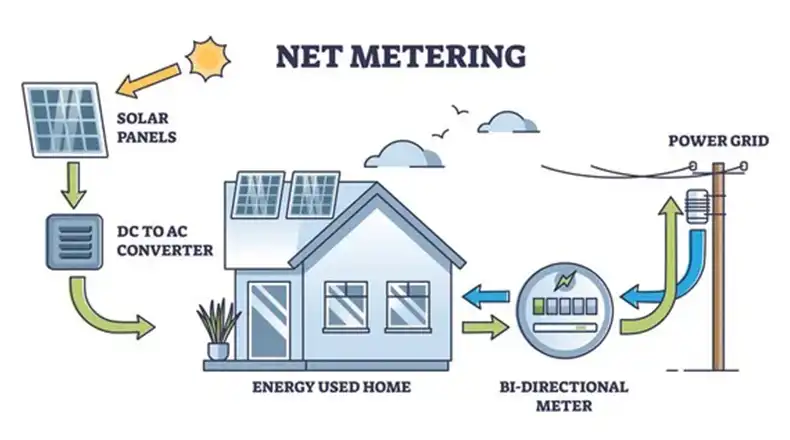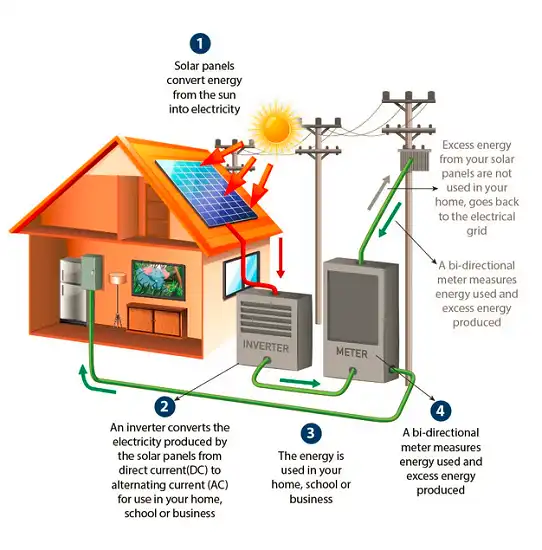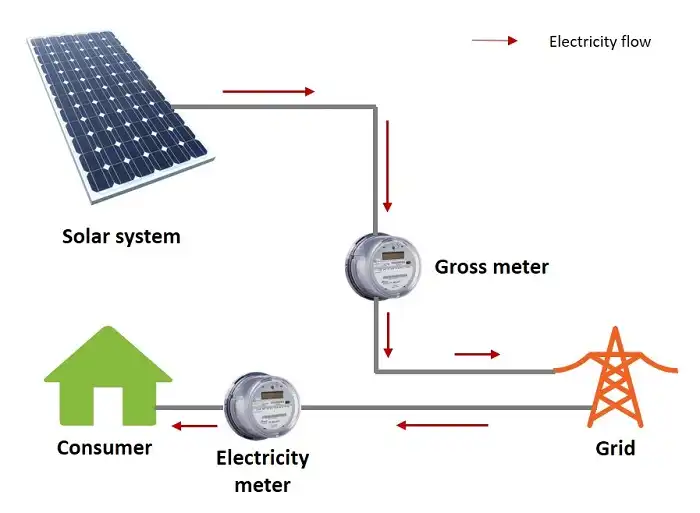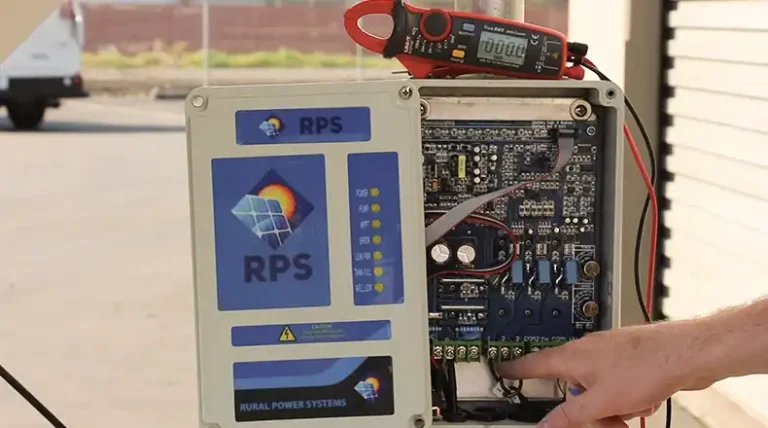What is Net Metering?
Net metering is a billing mechanism that allows residential and commercial customers who generate their own electricity from solar power or other renewable energy sources to feed the excess electricity back into the grid. In simple terms, it’s like using the electricity grid as a “battery” to store the surplus energy you generate.

How Net Metering Works
Imagine your home has a solar panel system installed on the roof. During the day, your solar panels generate electricity, and any excess electricity that your home doesn’t use is sent back to the utility grid. This is where net metering comes into play.

With net metering, your home is equipped with a special bi-directional meter that can measure the flow of electricity in both directions – from the grid to your home and from your home to the grid. When you send excess electricity back to the grid, your meter runs backward, essentially “banking” those energy credits for you.
Benefits of Net Metering
Net metering offers several benefits to both consumers and utility companies:
- Reduced Electricity Bills: By generating your own electricity with solar panels, you can significantly reduce your monthly electricity bills or even eliminate them entirely, depending on your energy consumption and solar system size.
- Energy Independence: With net metering, you become less reliant on the utility company for your electricity needs, promoting energy independence and self-sufficiency.
- Environmental Benefits: Solar energy is a clean, renewable energy source that doesn’t produce greenhouse gas emissions or other pollutants, making it an environmentally friendly choice.
- Potential Income: In some cases, if you generate more electricity than you consume over an extended period, your utility company may compensate you for the excess energy you’ve contributed to the grid.
What’s the Difference Between Net Metering & Net Billing
While net metering and net billing are often used interchangeably, there are some key differences between the two:
| Aspect | Net Metering | Net Billing |
| Billing Method | Electricity meters spin backward when excess energy is sent to the grid, offsetting electricity consumption. | Excess energy sent to the grid is credited at a predetermined rate, typically lower than the retail electricity rate. |
| Credit Compensation for Excess Electricity | Credited at the full retail rate for electricity. | Credited at a lower rate than the retail rate, often based on avoided cost or wholesale rates. |
| Examples | California, New Jersey, New York | Minnesota, Utah, Idaho |
Explanation of Net Metering and Net Billing Differences
With net metering, the excess electricity you generate is essentially used to offset your electricity consumption on a one-to-one basis, meaning you receive full retail credit for the excess energy you send back to the grid.

On the other hand, net billing compensates you for the excess electricity you generate, but at a predetermined rate that is typically lower than the retail electricity rate. This rate is often based on the utility company’s avoided cost or wholesale rates for electricity.
Types of Net Metering Programs
Standard Net Metering
Standard net metering is the most common form of net metering. In this program, you receive credits for the excess electricity you generate at the full retail rate, and those credits can be carried over from month to month to offset your future electricity consumption.
Time-of-Use Net Metering
Time-of-use net metering is a variation where the credits you receive for the excess electricity you generate vary depending on the time of day. For example, you may receive higher credits for the electricity you generate during peak demand hours when electricity is more valuable to the utility company.
Virtual Net Metering
Virtual net metering is designed for situations where installing solar panels on your property may not be feasible or practical. With virtual net metering, you can subscribe to a shared solar energy system, often called a “community solar garden,” and receive credits on your utility bill for the electricity generated by your share of the system.
Net Metering Policies and Regulations
Role of State and Local Governments
Net metering policies and regulations are primarily determined at the state and local government levels. Each state has its own set of rules and regulations governing net metering programs, including eligibility requirements, system size limits, and credit compensation rates.
Utility Company Involvement and Net Metering Programs Offered
Utility companies play a crucial role in implementing and administering net metering programs within their service areas. Many utility companies offer their own net metering programs, which must comply with state regulations and policies.
Potential Policy Changes and Future Outlook
As solar energy adoption continues to grow, there is an ongoing debate surrounding net metering policies and their impact on utility companies and electricity rates. Some utility companies argue that net metering shifts costs unfairly to non-solar customers, while solar advocates contend that net metering promotes the growth of renewable energy and provides societal benefits.
Policymakers and regulators will likely continue to evaluate and adjust net metering policies in response to changing market conditions, technological advancements, and stakeholder concerns.
How to Evaluate Net Metering for Your Situation
System Size and Electricity Usage Patterns
To determine if net metering is a cost-effective option for you, it’s essential to consider your electricity usage patterns and the size of the solar energy system you plan to install. A larger system may generate more excess electricity, potentially leading to greater savings or compensation under a net metering program.
Net Metering Program Details and Compensation Rates
Before committing to a solar energy system, thoroughly research the details of your local utility company’s net metering program. Pay close attention to factors such as system size limits, credit compensation rates, and any applicable fees or charges.
Cost-Effectiveness of Installing a Solar Energy System
While net metering can provide financial benefits, it’s crucial to evaluate the overall cost-effectiveness of installing a solar energy system. Factors to consider include the upfront costs of the system, available incentives and tax credits, and the projected long-term savings on your electricity bills.
Net Metering vs. Gross Metering
Definition of Gross Metering
Gross metering, also known as “buy-all, sell-all,” is an alternative billing mechanism where all the electricity generated by a solar energy system is sent to the utility grid, and the homeowner or business purchases back all the electricity they need at the retail rate.

Differences Between Net Metering and Gross Metering
The key difference between net metering and gross metering lies in how the excess electricity generated is handled:
Net Metering:
- Allows for two-way flow of electricity between the home/business and the grid
- Excess electricity generated is sent to the grid, and credits are received
- Credits can offset future electricity usage and costs
- Net usage determines the final monthly bill
Gross Metering:
- Only measures the total electricity generated by the solar system
- No two-way flow of electricity or credits for excess generation
- All electricity generated is purchased by the utility at a predetermined rate
- Homeowner/business still pays full retail rate for any electricity consumed
Key Distinctions:
- Net metering provides credits for excess generation to offset usage
- Gross metering pays for all generation but no offset for consumption
- Net metering is more beneficial for self-consumption of solar power
- Gross metering may be better for larger solar installations focused on selling power
The choice between net metering and gross metering will depend on factors such as your electricity usage patterns, local policies, and the compensation rates offered by your utility company.






